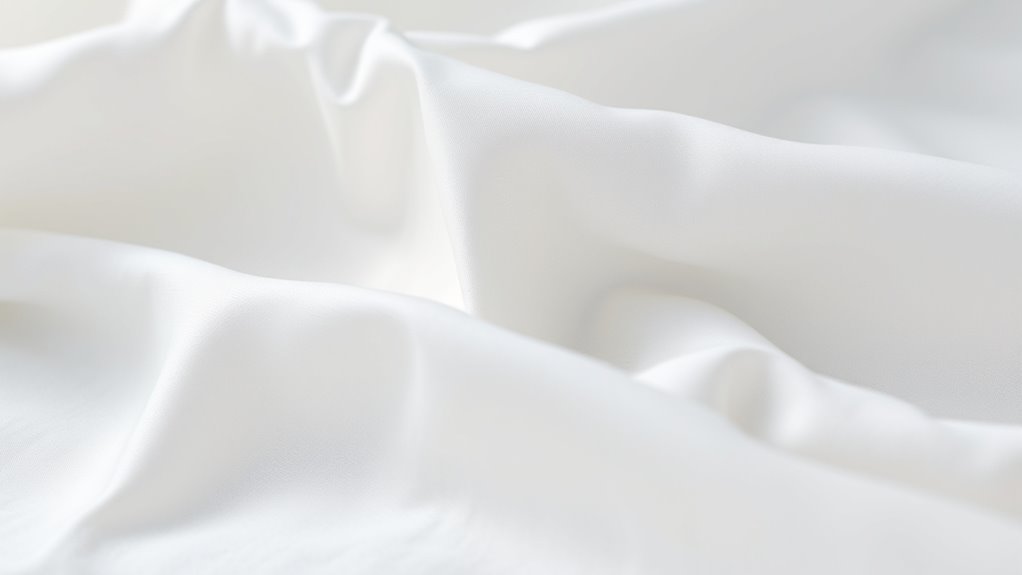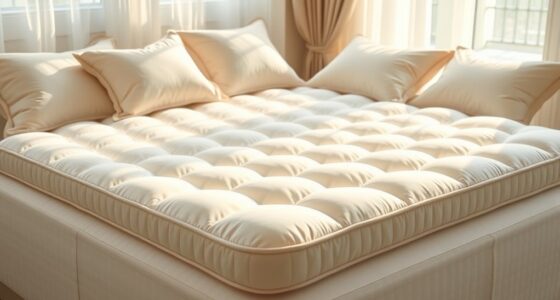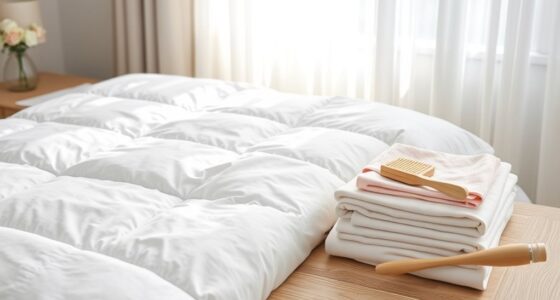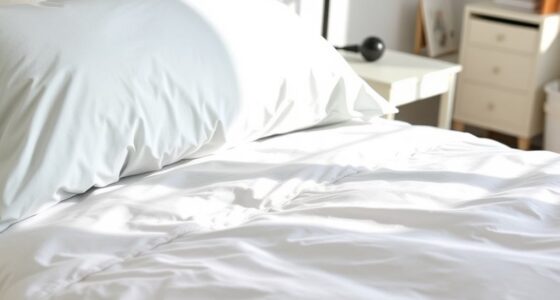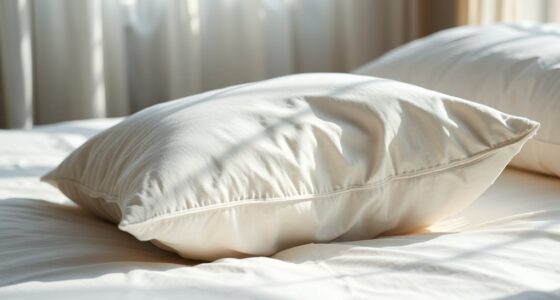Many believe that higher thread counts mean better sheets, but that’s a myth. What truly matters are the fiber quality, weave, and finishing techniques, which affect softness and durability more than just thread count. A sheet with a lower thread count can feel softer and last longer if made well from premium fibers like Egyptian or Pima cotton. To make smarter choices, consider all these factors—there’s more to sheet quality than what meets the eye.
Key Takeaways
- Higher thread counts don’t always mean softer or more durable sheets; fiber quality and weave are more important.
- Premium fibers like Egyptian or Pima cotton enhance softness regardless of thread count.
- The fabric’s weave and construction impact both feel and longevity more than thread count alone.
- Overprocessing or low-quality fibers can cause high thread count sheets to wear out quickly.
- Focus on fiber type, weave, and brand reputation for better comfort and durability instead of just thread count.
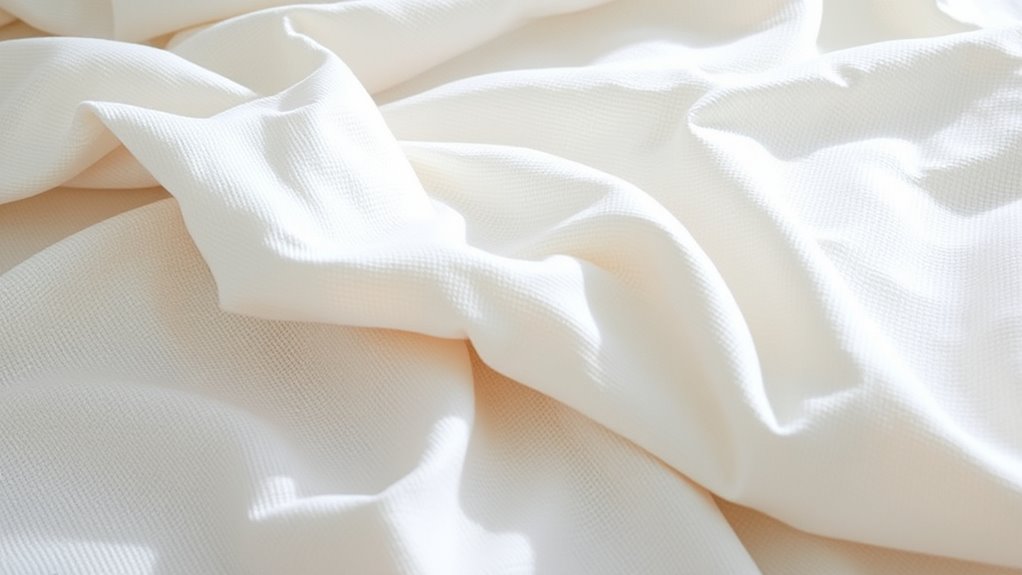
Have you ever been told that higher thread counts automatically mean better sheets? It’s a common belief, but the truth is more nuanced. While a higher thread count can contribute to fabric softness and durability factors, it doesn’t guarantee you’ll get the perfect sheet. Many people assume that a thread count of 400 or more automatically leads to luxurious, long-lasting bedding, but that’s not always the case. The quality of the fibers and the weave matter just as much—if not more—than the number printed on the label.
Higher thread count alone doesn’t guarantee luxurious, durable sheets—fiber quality and weave are equally important.
When evaluating fabric softness, it’s tempting to focus solely on thread count, but softness depends largely on the type of fibers used. Cotton, for example, varies widely in softness depending on whether it’s Egyptian, Pima, or upland cotton. These premium fibers tend to feel softer and more luxurious, regardless of the thread count. Higher thread counts can sometimes make sheets feel denser or heavier, which might not be what you want if you prefer lightweight, breathable bedding. So, instead of obsessing over the number, consider the fiber quality and the weave. A well-made sheet with a lower thread count but high-quality cotton can feel just as soft—if not softer—than a higher thread count sheet made from inferior fibers. Additionally, the fabric construction and finishing techniques influence the overall feel and longevity of your sheets.
Durability factors are equally important when choosing sheets. A higher thread count can sometimes mean a tighter weave, which enhances durability, but that’s not a universal rule. The construction of the fabric, the type of fibers, and the finishing process all influence how long your sheets will last. For example, a tightly woven sheet made with strong fibers will hold up better over time than a loosely woven sheet with a higher thread count. Cheaper, overly processed sheets might have a high thread count but wear out quickly, develop pilling, or lose their softness after just a few washes.
Ultimately, the key is to look beyond the thread count. Focus on the fiber type, the weave, and the brand’s reputation for quality. A balanced approach—considering both softness and durability factors—will help you find sheets that feel good and last longer. Remember, a sheet with a high thread count isn’t automatically better; it’s just one piece of the puzzle. Prioritize what matters most to your comfort and longevity, and you’ll make smarter choices when shopping for bedding.
Frequently Asked Questions
How Does Fabric Material Affect Sheet Quality?
When choosing sheets, fabric material greatly impacts quality. Your fiber blend determines softness, durability, and breathability, while the weave pattern influences texture and how well sheets hold their shape. For instance, cotton with a sateen weave feels silky, whereas percale provides crispness. You should consider both the fiber blend and weave pattern to find sheets that match your comfort preferences and last through frequent washes.
Is Higher Thread Count Always More Durable?
You might think higher thread count means more durability, but that’s not always true. In fact, some sheets with a thread density of 300 last just as long as those with 600. Durability depends more on weave complexity and fabric quality. Thicker isn’t always better; a well-made, tightly woven sheet can withstand wear better than a simply woven, high thread count one. Focus on quality, not just numbers.
What Other Factors Influence Sheet Softness?
You might think higher thread count means softer sheets, but fiber blends and weave types play bigger roles. For softness, look for natural fibers like cotton or linen, and consider how the fabric is woven—percale or sateen, for example, offers different feels. A smooth, tight weave enhances softness, regardless of thread count. So, focus on fiber quality and weave style to find sheets that feel truly plush and comfortable.
Do Luxury Sheets Have Higher Thread Counts?
Imagine luxury sheets like a finely woven tapestry, shimmering with elegance. Usually, they do have higher thread counts, but don’t be fooled—fiber blends and fabric quality matter more. Thread count myths suggest higher numbers mean better softness, yet many luxury sheets focus on quality fibers and craftsmanship instead. So, a higher thread count isn’t always the secret to plushness; it’s the thoughtful blend that truly enhances comfort.
How Should I Care for Different Sheet Types?
When caring for different sheet types, you should always follow the care instructions provided. For example, percale sheets with a tight fabric weave typically need gentle washing in cold water and low heat drying to maintain their crisp feel. Sateen sheets, with their softer finish, may require a slightly warmer wash. Always check labels to make sure you preserve the quality and longevity of your sheets.
Conclusion
So, next time you’re shopping for sheets, will you fall for the myth of higher thread counts? Remember, comfort isn’t just about numbers — it’s about quality fibers, weave, and feel. Don’t let the hype fool you into overspending. Instead, focus on what truly matters for a good night’s sleep. After all, isn’t your restful sleep worth prioritizing over a misleading number? Choose wisely and sleep soundly.
